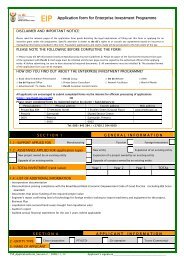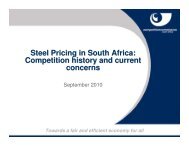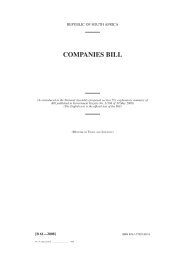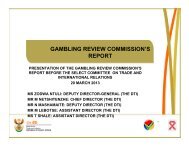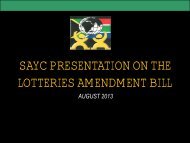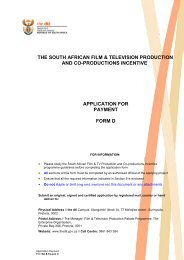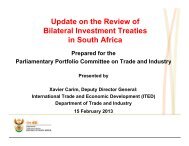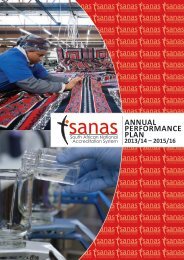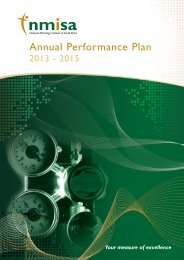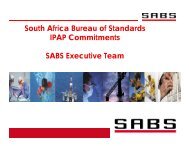Copyright Review Commission Report - ICT Law and Regulation ...
Copyright Review Commission Report - ICT Law and Regulation ...
Copyright Review Commission Report - ICT Law and Regulation ...
- No tags were found...
You also want an ePaper? Increase the reach of your titles
YUMPU automatically turns print PDFs into web optimized ePapers that Google loves.
4.3.16. In 2009, in what was coined a ‘ringtone royalties wrangle’, NORM instructed corporate <strong>and</strong> commercial law firm,Werksmans, to issue a letter to WASPA. John Fishlock, board member of NORM, explained:We’re not here to take people to court, but it’s been a three-year-long battle to get digital service providers on boardlegitimately. With the action we’re taking now, we’re confident that our composers will be properly recompensed for theirworks.We have requested WASPA to forward correspondence to all its members, to whom we have sent downloadagreements ... If they have not signed before the end of August 2009, they will not enjoy the st<strong>and</strong>ard discounted rateas all other service providers who have concluded agreements with NORM already. If they fail to sign by the deadline,that preferential rate will fall away <strong>and</strong> they will have to account at the base rate.4.3.17. Janine Hollesen, an attorney representing NORM, said download agreements are being signed by mobileoperators <strong>and</strong> major digital service providers. She noted:Although a number of WASPA members have been in contact with NORM <strong>and</strong> have signed the agreement, pursuant tothe correspondence sent to them, there are many WASPA members who are unenthusiastic about giving composerstheir due. Their continued use of composers’ works without paying royalties is unauthorised in terms of the <strong>Copyright</strong>Act <strong>and</strong> constitutes an infringement of the composer’s rights as administered by NORM.The <strong>Copyright</strong> Act makes it a criminal offence to knowingly use copyrighted works without authorisation. WASPAmembers will not be able to plead ignorance if one considers WASPA’s code of conduct <strong>and</strong> that many of its members,including one of its biggest, Exactmobile, have signed the NORM agreement.4.3.18. The WASPA representative noted that WASPA had made huge efforts to educate WASPs <strong>and</strong> encouragedlicensing at every opportunity. All WASPA members were advised to contact NORM <strong>and</strong> SAMRO <strong>and</strong> to signthe licensing agreements. The WASPA representatives argued that it was not their role to ensure that membersactually entered into licensing agreements with the collecting societies as it is a self-regulating body.4.3.19. WASPA representatives have argued that the main issue in the collection of the royalties is that collectingsocieties lack processes to identify whom they represent, making it difficult to send invoices timeously.Allegations were made that NORM tended to focus on a few individual players rather than the whole market.4.3.20. It was also argued that the collecting societies have not been proactive in exploiting <strong>and</strong> enforcing theirmembers’ rights in the digital market. It was noted by the representatives of WASPA – <strong>and</strong> reiterated by arepresentative from the Internet Service Providers Association (ISPA) – that collecting societies are notempowered to deal authoritatively with the challenges of online music exploitation. This is refuted by the factthat SAMRO has prepared licensing agreements for all online music services described in 4.3.4 above as wellas ‘Burn-on-Dem<strong>and</strong>’ services, ‘Digital Juke Boxes’ <strong>and</strong> web-page advertising.4.3.21. A RiSA report (Digital Music Statistics) on digital music statistics estimates that approximately 3,6 million songsare illegally downloaded in South Africa on a monthly basis, translating into monetary losses of R36 millionmonthly <strong>and</strong> R432 million annually. A PricewaterhouseCoopers report (Entertainment <strong>and</strong> Media Outlook<strong>Report</strong> (2010)) estimates that if the current trend continues, by 2014 the potential revenue loss due to copyrightinfringement will be in excess of R500 million per year.- 34 -



